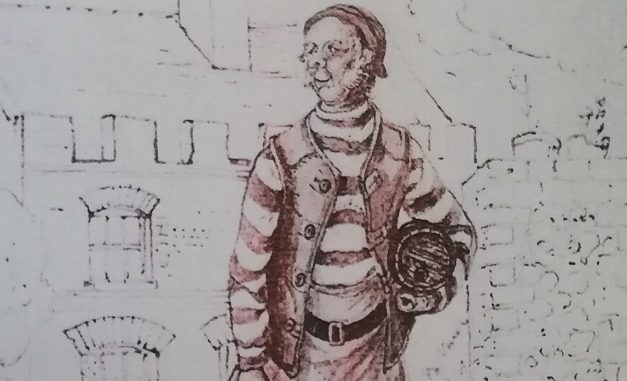
It seemed that luck had finally run out for Joss Snelling. For some, particularly those serving for His Majesty’s revenue and the locals of Thanet, who lived in fear of him and his band of “free traders”, it had been a long time coming. But now it appeared the Broadstairs smuggler would finally get his comeuppance — wouldn’t he?
Born in St Peters in 1741, over the years Snelling had been a dab hand at keeping his “owling” activities clandestine, so much so that most of his exploits are unrecorded. Only when a smuggling operation of his didn’t go according to plan does Snelling’s name appear in the records. One such foul-up occurred during the early hours of a misty March morning in 1769.
On the shore between Kingsgate and Foreness Point, Snelling and the rest of the Callis Court Gang had almost completed unloading a boat load of contraband when the rumble of horses’ hooves came echoing through the mist. ‘Halt!’ a voice commanded. ‘In the name of the King I command you to halt!’ The order had been issued by the lead officer in an Excise patrol.
‘Fire and be damned,’ one of the smugglers reputedly shouted as he threw a keg of spirits at the advancing horsemen. A volley of shot followed, hitting a smuggler who fell into the surf, turning the water around him crimson.
During the ensuing bloody battle, one of Snelling’s men was shot in the face by a revenue officer, who was in turned stabbed in the chest. Another of the King’s men was bludgeoned with a boathook and his attacker run through with a cutlass. Some of the horses, startled by all the noise, bolted through the thronging mass, trampling men on both sides.
Snelling and a few others tried to escape through a break in the cliffs known as Kemp’s Stairs, only to be challenged by a solitary officer on his horse. He was promptly shot in the chest, some say by Snelling himself. This courageous young man was taken to the Captain Digby Inn, where he sadly died. His attackers melted into the surrounding neighbourhood.
Later that day, the authorities conducted a house-to-house search of all premises in Reading Street (then a notorious smuggling haunt) and found one dead smuggler and another injured. Eight of Snellings gang had been captured and were later hanged at Gallows Field just outside Sandwich. Snelling himself managed to evade capture and no proof of his involvement, by the authorities, was established. The conflict itself became known as the Battle of Botany Bay.
Within a year of the famed battle, Snelling recruited new men into his gang, doubling its original size. Many of these rouges he found in the local pubs, places such as the Fig Tree Inn (now a private cottage on Callis Court Road). In time he would even recruit his son George and his grandson.
Thirteen years later, Prime Minster William Pitt the Younger, concerned by the loss of revenue caused by the activities of the Callis Court Gang, ordered the 13th Light Dragoons into Thanet to assist the coastguard in tackling this ‘wicked trade’. However, the effective policing of the island’s coastline was largely unsuccessful. The smugglers just simply bribed local officials to turn a blind eye to contraband goods as they arrived. And if that didn’t work then more persuasive means were employed.
Snelling became such a notorious local celebrity that in 1829 he was introduced to the future Queen Victoria as ‘Joss Snelling, the famous Broadstairs smuggler’ when she stayed at Broadstairs’ Piermont Hall. About a year later, though, his luck suffered another setback.
In October 1830, the Kentish Gazette ran a brief story about the capture of two smugglers. David Mutton and a man who only identified himself as ‘Sharp’ had been discovered ‘busy at their work’ near the Coast Blockade Station at West Brook. ‘…the Preventative men repaired to the spot,’ the paper wrote, ‘where they succeeded in securing 61 tubs of foreign spirits…’ It later transpired that the man ‘Sharp’ was actually Joss Snelling.
Both were brought before the Margate Magistrates. ‘The crowd that collected outside amounted to about 700 men, women and children beside the preventative men,’ the Kentish Gazette announced. Those in the packed public gallery witnessed as both men were found guilty and ordered to pay a fine of £100 (around £11, 000 today), the default of which would result in imprisonment. Despite this Snelling went straight back to his smuggling operations.
He died, at the age of 96, in 1837 and was buried in St Peter’s Churchyard, though there is no entry of his burial in the local register.

